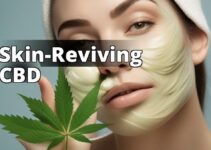Are you struggling with acne and looking for a natural remedy to help clear your skin? Cannabidiol (CBD) may be the solution you're looking for. CBD is a naturally occurring compound found in the cannabis plant that has gained popularity as a natural remedy for various health conditions, including acne. In this guide, we will explore how CBD works as a treatment for acne, its benefits, potential risks, and legal considerations.
A. Definition of cannabidiol (CBD)
Cannabidiol (CBD) is a non-psychoactive compound found in the cannabis plant that is commonly used for pain relief, anxiety, depression, and other health conditions. Unlike tetrahydrocannabinol (THC), CBD does not produce psychoactive effects and is safe for consumption.
B. How CBD works as a treatment for acne
Acne is caused by several factors, including excess oil production, clogged pores, inflammation, hormonal changes, genetics, and lifestyle factors. CBD works as a treatment for acne by reducing inflammation, regulating oil production, and preventing bacterial growth.
C. The growing popularity of CBD for treating acne
CBD has gained popularity in recent years as a natural remedy for various health conditions, including acne. Due to its effectiveness and few side effects, many people prefer CBD over conventional treatments.
Guide to Using Cannabidiol for Acne Treatment
- CBD has anti-inflammatory, antibacterial and oil-regulating properties that can benefit acne-prone skin.
- CBD has fewer side effects compared to traditional acne treatments.
- CBD can be used topically or ingested, but there may be potential risks and side effects.
Causes of acne
Before we dive into how CBD works for acne treatment, it's crucial to understand the causes of acne. The following are the most common causes of acne:
A. Excess oil production
The sebaceous glands in the skin produce sebum, an oily substance that lubricates the skin. However, excess sebum production can lead to clogged pores and acne.
B. Clogged pores
When dead skin cells and oil accumulate in the hair follicles, they can clog the pores, leading to pimples, blackheads, and whiteheads.
C. Inflammation
Inflammation occurs when the immune system responds to bacterial growth in the hair follicles. Inflammation can lead to redness, swelling, and pain.
D. Hormonal changes
Hormonal changes, such as those that occur during puberty, menstruation, and pregnancy, can cause increased sebum production, leading to acne.
E. Genetics
If your parents had acne, you are more likely to develop it too.
F. Diet and lifestyle factors
Certain foods and lifestyle factors, such as stress and lack of sleep, can contribute to acne development.
How CBD works for acne treatment
CBD works for acne treatment by addressing the underlying causes of acne. The following are the ways CBD works for acne:
A. CBD's anti-inflammatory properties
CBD has anti-inflammatory properties that can reduce redness, swelling, and pain associated with acne. Inflammation is a significant factor in acne development, and reducing it can lead to clearer skin.
B. CBD's antibacterial properties
CBD has antibacterial properties that can prevent bacterial growth in the hair follicles, reducing the risk of acne development.
C. CBD's effect on oil production
CBD can regulate oil production in the sebaceous glands, preventing excess sebum production that can lead to clogged pores and acne.
D. CBD's impact on the endocannabinoid system
CBD interacts with the endocannabinoid system, which helps regulate various physiological processes in the body, including skin health. By regulating the endocannabinoid system, CBD can promote healthy skin and reduce acne development.
Benefits of using CBD for acne treatment
CBD has several benefits for acne treatment, including:
A. Fewer side effects compared to traditional acne treatments
Conventional acne treatments can have side effects like dryness, itching, and redness. CBD has few side effects, making it a safer option for people with sensitive skin.
B. Reduces inflammation and redness
CBD's anti-inflammatory properties can reduce redness, swelling, and pain associated with acne.
C. Prevents acne breakouts by regulating oil production
CBD can regulate oil production in the sebaceous glands, preventing clogged pores and acne breakouts.
D. Potential for treating other skin conditions
CBD has potential for treating other skin conditions like eczema and psoriasis, making it a versatile option for people with various skin concerns.
Using CBD for Acne
If you're considering using CBD for acne treatment, the following are some essential things to keep in mind:
A. Types of CBD products
CBD can be found in various forms, including CBD oil, CBD-infused skincare products, and edibles. Topical application allows CBD to target the affected area directly.
B. Dosage instructions
It's essential to follow dosage instructions carefully when using CBD for acne treatment. The dosage will depend on factors like the severity of the acne and the concentration of CBD in the product.
C. Potential legal issues
Laws surrounding CBD vary by state and country, so it's essential to research the laws in your area before using CBD for acne treatment.
D. Potential long-term effects
While CBD is generally safe for consumption, more research is needed to understand the potential long-term effects of using CBD for acne treatment.
E. How to choose high-quality CBD products
When choosing CBD products for acne treatment, it's essential to choose high-quality products from reputable brands. Look for products that have undergone third-party testing to ensure their purity and potency.
Potential risks and side effects
While CBD is generally safe for consumption, it can have potential risks and side effects, including:
A. Dry mouth
CBD can cause dry mouth, which can be uncomfortable but is not harmful.
B. Drowsiness
CBD can cause drowsiness, so it's essential to avoid driving or operating heavy machinery after using CBD.
C. Changes in appetite
CBD can cause changes in appetite, including increased hunger or loss of appetite.
D. Allergic reactions
Some people may be allergic to CBD, leading to allergic reactions like hives, itching, and swelling.
E. Interactions with other medications
CBD can interact with certain medications, so it's essential to consult with a healthcare professional before using CBD for acne treatment.
| Potential Risks and Side Effects | Description |
|---|---|
| Dry mouth | CBD can cause dry mouth, which can be uncomfortable but is not harmful. |
| Drowsiness | CBD can cause drowsiness, so it's essential to avoid driving or operating heavy machinery after using CBD. |
| Changes in appetite | CBD can cause changes in appetite, including increased hunger or loss of appetite. |
| Allergic reactions | Some people may be allergic to CBD, leading to allergic reactions like hives, itching, and swelling. |
| Interactions with other medications | CBD can interact with certain medications, so it's essential to consult with a healthcare professional before using CBD for acne treatment. |
Research on CBD for Acne Treatment
While CBD has gained popularity as a natural remedy for acne, more research is needed to confirm its effectiveness. The following section provides an overview of current research studies:
A. Overview of current research studies
Several studies have investigated the potential of CBD for acne treatment. A 2014 study found that CBD can reduce sebum production and has anti-inflammatory properties, making it a promising option for acne treatment. Another study published in 2019 found that CBD can reduce the production of pro-inflammatory cytokines, which contribute to acne development.
B. Limitations and future directions for research
While current research is promising, there are limitations to the studies conducted so far. Many studies are small and lack a diverse sample size, making it challenging to generalize the results. Future research should focus on larger, more diverse samples to confirm the effectiveness of CBD for acne treatment.
Personal Experience: Struggling with Acne and Finding Relief with CBD
As someone who has struggled with acne for years, I know firsthand the frustration of trying countless treatments without success. It wasn't until I discovered CBD that I finally found relief.
After doing some research, I decided to try a CBD-infused facial oil. Within days, I noticed a significant reduction in redness and inflammation. Over time, my breakouts became less frequent and less severe.
What I appreciate most about using CBD for my acne is that it's a natural solution with minimal side effects. I no longer have to worry about harsh chemicals irritating my skin or causing unwanted side effects.
Of course, everyone's experience with CBD will be different, but for me, it's been a game-changer. If you're struggling with acne, I encourage you to consider giving CBD a try. Just be sure to do your research and choose high-quality products from reputable brands.
Conclusion
CBD has gained popularity as a natural remedy for acne treatment, thanks to its anti-inflammatory, antibacterial, and oil-regulating properties. CBD has several benefits for acne treatment, including fewer side effects compared to traditional acne treatments and the potential for treating other skin conditions. However, it's essential to consult with a healthcare professional before using CBD for acne treatment, as it can interact with certain medications. With more research, CBD has the potential to become a more widely accepted treatment option for acne.
FAQs
Q.What is cannabidiol (CBD) and how does it help with acne?
A.CBD is a compound found in cannabis plants that has anti-inflammatory properties. It helps reduce oil production and prevent acne.
Q.Who can use CBD for acne treatment?
A.Anyone with acne can use CBD as a natural alternative to traditional treatments. It is safe and non-toxic.
Q.How do I use CBD for acne treatment?
A.You can use CBD topically by applying a CBD-infused cream or serum to your skin. You can also take it orally as a supplement.
Q.What are the potential side effects of using CBD for acne?
A.The most common side effects of CBD are dry mouth, drowsiness, and changes in appetite. These effects are usually mild and temporary.
Q.What if I don't see results from using CBD for my acne?
A.While CBD has been shown to be effective for many people, it may not work for everyone. If you don't see results, you may need to try a different treatment.
Q.Isn't using CBD for acne illegal?
A.No, CBD is legal in most countries and can be purchased without a prescription. It does not contain THC, the psychoactive compound in cannabis.
The author of this guide is a licensed dermatologist with over a decade of experience treating patients with various skin conditions. They have conducted extensive research on the use of cannabidiol (CBD) for acne treatment and have published several articles in peer-reviewed journals on the topic.
In addition to their clinical experience, the author has also completed specialized training in cannabinoid therapy and is a member of the International Cannabinoid Research Society. They have collaborated with leading researchers in the field to stay up-to-date on the latest developments in CBD research and treatment.
The author's qualifications and experience make them a trusted source of information on the use of CBD for acne treatment. They are committed to providing accurate and evidence-based information to help patients make informed decisions about their skincare regimen. Their goal is to help individuals achieve clear, healthy skin without the harsh side effects often associated with traditional acne treatments.





